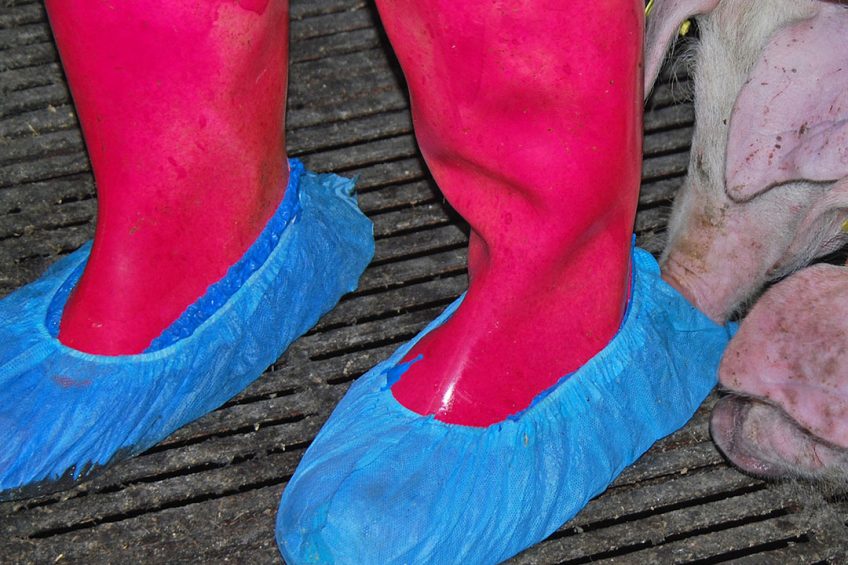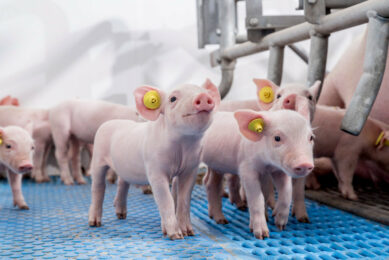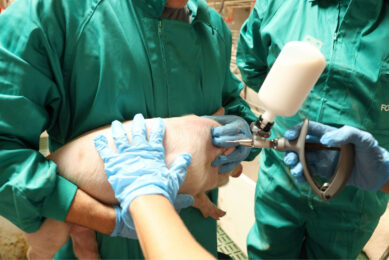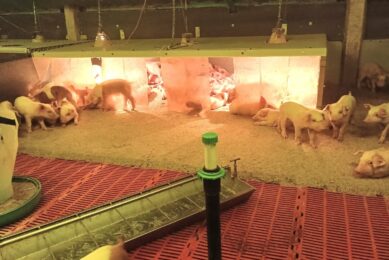The more Lawsonia, the more gut health problems

Virtually all pigs in the world are carriers of the bacteria Lawsonia intracellularis (L.i.). In pigs of all ages, that can cause the gut health problem porcine intestinal adenopathy (PIA).
PIA has a chronic as well as an acute form. It is hard to recognise pigs suffering from the chronic variety, as clinical signs occur with a whole range of health problems: just a little bit more weight difference within groups, slightly less growth, not as well in shape, diarrhoea to a certain degree. The acute variety is easier to recognise: pigs suddenly dying by the end of the finisher period, often the best performing ones. Sometimes the mortality comes with bloody manure.
Not knowing how the bacteria moves is the biggest problem when trying to tackle this health issue.” – Ken Steen Pedersen, professor of herd diagnostics and antibiotic use in pigs.
How does L.i. move between pig farms?
It is a huge mystery as to how the bacteria moves between pigs and farms, according to Ken Steen Pedersen, professor of herd diagnostics and antibiotic use in pigs at the University of Copenhagen, Denmark. He recently spoke at a PIA conference organised by MSD Animal Health in the Netherlands. He said, “It is the biggest problem when trying to tackle this health issue.”
At the conference, he presented the results of a survey to 11 Danish sow farms which were completely emptied, then cleaned and disinfected and then repopulated with Specific Pathogen Free sows, free from L.i.. Production results proved to be excellent. The piglets’ average daily gain in the first weeks post-weaning was over 600g. Despite all preventive measures, all farms were hit by the L.i. bacteria again within 12-18 months. Steen Pedersen, also CEO of the veterinary practice Ø-Vet, said: “The disease hit very hard, immediately.”

Gut Health Special
Managing gut health is very complex with many parameters to consider. This special issue highlights specie-specific topics including stress-related intestinal issues in weaning pigs.
Clear connection between contamination and results
Pedersen indicated that there was a clear connection between the degree of contamination and the technical results of weaned pigs and finisher pigs. In case fewer than 1 million L.i.-bacteria per g manure can be demonstrated, then there is no measurable effect of the daily gain of finisher pigs.
Weaned pigs excreting over 1 million L.i. bacteria per g of manure, however, grew 20 g/day less than then control group of non-contaminated piglets. In case animals have been excreting more than 10 million L.i. bacteria per g manure, then the growth loss per day is increasing to 110 g/day. This was all measured during a timeframe of 19 days, having artificially contaminated SPF piglets.
In case of finisher pigs, the growth loss is 65 g/day in a timeframe of 8 weeks if the amount of L.i. bacteria is over 1 million per g manure. Should the amount be tenfold, then the growth loss is 389 g/day in the same period.

Pig Progress health tool
Find out all there is to know about pig health
Assessing the amount of bacteria
Trying to assess the amount of bacteria happened with a qPCR test. Per analysis in Denmark, this costs about € 100. The application of this test will soon lead to very high costs in farms. Pedersen also researched the effect of sample combination on the reliability of the result. For that, he took 20 individual manure samples, as well as 1 mixed sample on 43 farms. The results of these individual manure samples match those of the mixed samples.
He collected the mixed samples by walking through the manure in the pens wearing plastic sampling socks. The method, according to Pedersen, is quick and easy.











